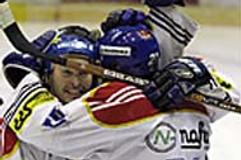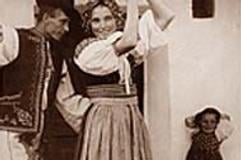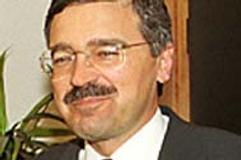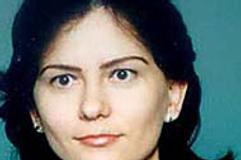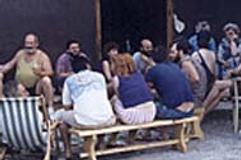Archive of articles - August 2000, page 3
If you desire to read an old article, use the search bar or select the publication date.
Latin Americans still dancing the Slovak nights away
The lights were dimmed. The music was Latin. It was three o'clock on a spring morning and 25 couples were still boogying. Ramone M, a Mexican-American, turned to an acquaintance with a loose grin and said, "Hey buddy, I tell you what. Slovak women love Latinos."The scene was Fiesta Latina, a monthly Latin American party in Bratislava which, if you like the festive Latino culture, is the place to be. Bratislava fiestas - where Latin music is played and Latin dancing is learned, brushed up on, and enjoyed - often go on until the morning light, and are routinely attended by hundreds of Slovaks and Latinos.Although the Latin American community in Slovakia is not large - its members put the number in Bratislava, the Slovak city with the most Latinos, at about 50 - their culture has a strong impact on the night life of the capital. This is due, say Latinos, to the enthusiasm of Slovaks for Latin American dance and music, and to the propensity of Latin people to celebrate and spread their culture.
SAN - a solution for a new century
Many companies now own and manage tens to hundreds of IT systems often literally kilometres away from eachother. These systems are often very powerful, with huge capacities and powerful peripheral equipment designed for data back-up or archives. Servers communicate with each other via LAN and WAN nets.But there are problems. Data stored in such a way can only be read by identical platforms and their clients. As a result, data must be copied, upgraded, synchronized, or possibly migrated many times, and it must be stored at each platform or each location separately, at great risk of degradation of communication in LAN and WAN nets of medium-sized and larger companies. There is also a risk of database inconsistencies and major problems in data sharing in a heterogeneous environment.
Mikuláš Dzurinda: Time to break out the hiking boots
Mikuláš Dzurinda is a tough interview. Not in the usual sense, in that you have to prepare well to elicit good answers, but in that the most banal of questions can be met with inexplicable hostility. Seldom is an honest answer guarded more fiercely.This isn't the first time that this newspaper has had a perplexing conversation with the current prime minister. Back in August 1998, when Dzurinda was an opposition politician fighting for the top job, a reporter with this paper dared to ask him how he proposed to manage a party which de facto was composed of six chairmen - the heads of each of the Slovak Democratic Coalition's founding five members, and Dzurinda himself. The question was unprofessional, the reporter was told, and should be better prepared before it was put again.The then-spokesman of the party, Martin Lengyel, arranged a second interview at which the same questions were asked and intelligible responses given. We decided to go with the second interview because we felt readers would have gotten little out of the first save that Dzurinda must have been having a tough day.
From a 1969 law on The State Defence Council:
(1) The State Defence Council manages the organisation and the principal preparations to be taken for the defence of the Czechoslovak Socialist Republic... To meet this function it:b) approves basic measures to prepare the state organs and economies of the Czech and Slovak Federal Republics for the event of ware) suggests to the relevant state organs measures that are necessary to the management of the state in the case of war
SPP rethinks sports funding
Slovakia's athletes were dealt a major blow on August 9 when one of the biggest corporate sponsors in the country threatened to stop its sports funding because of government criticism of its expenditures.State-run gas utility Slovenský plynárenský priemysel (SPP), due to be privatised at the end of the first quarter of next year, has been told by the government that it should cut back on its corporate sponsorship. In the first half of this year, SPP's profits dropped by 38% to 5.77 billion crowns.SPP General Director Pavol Kinčeš told The Slovak Spectator that in light of recent criticisms from the Finance Ministry in particular - which said that as a state-run monopoly, SPP's promotional activities were not necessary - the tens of millions of crowns the utility pours into promotional activities, including cultural events and charities as well as sport, were being seriously reconsidered.
Mikuláš Dzurinda: "I see it very clearly"
As the current government nears the midway point of its four year election term, Prime Minister Mikuláš Dzurinda has much to cheer about. The trade balance and the public sector deficits, which ballooned under the 1994-1998 government of Vladimír Mečiar, have been brought under control; interest rates have fallen dramatically, while important privatisation projects such as the sale of banks, telecom and utility firms are underway. In recognition of these accomplishments, as well as of the political about-turn the country has taken since 1998, the Organisation for Economic Cooperation and Development (OECD) asked Slovakia to join its ranks at the end of July.But if one looks beneath the rosebush, one finds problems that refuse to go away. Unemployment, below 14% at the end of the Mečiar government, has shot up to 20%; real wages fell 3.1% in 1999 and a further 6.1% in the first quarter of this year, although economists now agree they have probably reached bottom. Public sector corruption has proven difficult to eradicate, and according to a majority of Slovaks remains prevalent particularly in schools, hospitals and state offices. Continuous political squabbles between the ruling coalition's 11 member parties have created the impression of instability, for all that the government has never been seriously in danger of falling.
Partial reforms: Citizens pay costs, lobby groups win
An expansive fiscal policy has immense consequences for the economy. It can ruin a country's rating by giving rise to external instability. It can render monetary policy ineffective, break down the fixed exchange rate regime, and triple public debt and contingent liabilities in the course of a few years. On the other hand, an expansive fiscal policy can keep the economy running in high gear for some time and help win elections. Fiscal policy in general plays a central role in determining overall economic development. Together with monetary policy, it influences short-term economic growth, balance of payments, debt levels and inflation rates. The policy shapes the entrepreneurial environment and dictates income redistribution.Much of the traditional economic theory concerning the politics of economic reform is based on the assumption of a J-curve. A J-curve simply describes the consumption pattern after reforms start - reforms drive aggregate consumption down in their early stages, before future consumption reaches a level higher than that initially. The traditional theory assumes the short-term losers of the reforms such as the unemployed, pensioners, and threatened state bureaucrats, will take revenge on the reforms at the first opportunity, leading to populist parties gaining power and halting the reforms.
Review: A respite from techno misery
Last Monday, an international beverage company kicked off a promotional campaign in Slovakia by setting up a mock bar in front of a downtown Bratislava department store. For several hours, four young men in black uniforms danced and mixed drinks for the crowd while techno music blared from several large speakers nearby.It has been said that giving Europeans the synthesiser was a mistake on the order of introducing opium to the Chinese. Both partnerships have caused serious social harm, although only the latter has met with a serious response.So it's somewhat refreshing when one discovers that electronic instruments do not bring out the worst musical instincts in all Europeans. Michal Kaščák, frontman of the popular Slovak band Bez Ladu a Skladu and organizer of country's Pohoda music festival, has gone electronic and pulled it off admirably. With his new CD Neuropa, he adds several features uncommon to electronic music - horns, gutsy guitar riffs, witty lyrics and intricate arrangements - to create a flashy and entertaining world of sounds.
The multiple facets of motivation
Try this. Take a sheet of paper, a pen, and sit together with your colleagues, friends, or even family members. Then tell them that they have to indicate three main reasons why they make the effort to go to work every day. Each person should also rank their choices in order of priority. Of course, money as a reason should be avoided in this exercise. Then compare each other's lists or write them on a flip chart for illustration.Whenever I do this with my students, which is usually in groups of 25 to 30 people, we end up with a mixture of reasons. Depending on the age and work experience of the students, the reasons vary from the feeling of importance and responsibility to the need to interact socially and to belong somewhere, to a feeling of usefulness, an opportunity to learn, to advance up the company ladder; the feeling of security to the need to be surrounded by friendly people.
News Briefs
HZDS launches campaign to "open citizens' eyes"Media watchdog says minorities get little coverageDzurinda testifies in illegal bonuses caseNorway suspends visa requirements for SlovaksHZDS would win elections if held now
Language school's woes pit owner against employees
Slovpro language schools are in trouble, and the two camps involved are pinning the blame on each other. With branches in Bratislava, Košice, Banská Bystrica, and Trnava, about the only thing that former Slovpro regional managers can agree upon with Slovpro founder and director Andrew Miller is that the school's recent financial results have been abysmal.Besides that point, however, the two sides can find no common ground as an ugly battle of barbed words and legal threats has resulted in Miller "cleaning house" while his former employees demand immediate payment of late salaries."Everyone is jumping ship on him [Miller]," said Gabriel Kindernay, the former Banská Bystrica regional manager.
Letters to the editor
No more bribing the boneheadsNo more cliché and slander
Why international firms pay more
As an HR consultancy firm we undertake many salary benchmarking surveys. We carry out these surveys for both international companies as well as pure (traditional) Slovak-owned companies. In average the international company (but also the modern/young Slovak company) pays 35% more. For single-job families the differences can be even bigger: HR Professionals earn 50% more at international companies than at Slovak companies!In the surveys we thoroughly examine differences in job profiles, descriptions, competence levels, output of the employee, his or her individual profile (skills, experiences, education, personality etc.) and many other items influencing salary levels. Some of our findings are outlined below.
Review: Photos reveal distant and different Slovakia
Pavol Socháň (1862-1941) was a painter, ethnographer, publicist, and amateur playwright. But he was most famous for his photography. Working at the turn of the 20th century, he captured the rural Slovak idyll at a time when nobody else cared to, then became a tireless ambassador for Slovak culture abroad. In Prague he published over 400 post-card photographs which were spread to Slovaks living in Yugoslavia and the Czech province, and in 1917 he conducted a lecture on Slovakia at the Metropolitan Muzeum of Arts in New York.Running through September 4, a collection of his simple and poignant work is on display at Galéria Profil. The 31 black and white photos, including eight landscape photos and 23 portraits, are straightforward, vivid glimpses of life as it was lived in Slovakia 100 years ago.
OECD invite spurs EU, NATO hopes
Slovak officials have said that they will now redouble their efforts to join the European Union and NATO after being invited to join the Organisation for Economic Cooperation and Development (OECD).Deputy Prime Minister for Integration Pavol Hamžík told The Slovak Spectator July 31 that after the invitation on July 28, Slovakia had become "a trustworthy partner again"."It [the OECD's invitation] is a historical decision for Slovakia and we've waited so long for it. We are now closer to entry to the EU and to NATO. It will make things [in negotiating entry] a lot easier, I believe," the deputy premier said.
No holidays for dealers
While much of the rest of Slovakia's economic sector slid into its usual summer torpor of holidays and quick breaks, dealers on financial and money markets had little time to rest this past month. The recovering health of President Rudolf Schuster, political in-fighting within one coalition party and a membership invitation from the OECD all had an impact on trading.After a turbulent June on the Slovak foreign currency market, the crown entered the new month in a favourable, calm atmosphere buoyed by positive news from the Innsbruck clinic about President Schuster's health.The pro-crown mood of some domestic, but mainly foreign, banks showed on the first day of July, when they squeezed the value of the crown with their buying from an opening level of 42.550/650 SKK/EUR to 42.370/470 SKK/EUR. A further factor was the sale of Slovak Telecom to Deutsche Telekom for 1 billion euros. Increasing confidence in the crown brought another strengthening to a limit of 42.250/350 SKK/EUR, but then domestic importers started to buy foreign currency and corrected the rate to 42.400/500 SKK/EUR.
Bratislavans viewed as self-centred by rest of country
Like every able-bodied Slovak male, 26 year-old reporter Marek Chorvatovič was required by law to spend a year in the Slovak Army. A native of Bratislava, Chorvatovič spent the first six months of his military service in Martin, a small city in the north of the country, where he lived with cadets from all corners of Slovakia."I got along great with everyone, and I still keep in touch with some of them," said Chorvatovič, reminiscing about his days as a soldier."But there was this one guy from Košice. When he was sober, he was fine. But every time he got drunk he would open my door right before he went to bed and shout obscenities having to do with my being from Brastislava, things like, 'Go to hell you punk from Bratislava.' This happened every single time he got drunk. Every single time. It was as if it were his job."
Business Briefs
Loans to corporate sector and private citizens up in JuneSlovnaft doubles exports over first half of 2000DMD Lombardini to make Martin facility focal pointBudget deficit at 9.9 billion crowns at end of JulyIMF praises banking and corporate sector progress
- News digest: Finns air unseen video of Fico shooting, PM’s bloody jacket driven away by minister
- Weekend: What to make of Easter in Slovakia
- Hundreds of people ousted from Bratislava’s Volkswagen
- US giant pulls plug on Slovak factory, axing 137 jobs
- 3 free things to do in Bratislava in the next seven days
- When to shop over Easter: Opening hours for supermarkets in Slovakia
- “Return not,” the ocean cried. But I returned for her
- Cockroaches and crumbling toilets greet seven-year-old battling serious virus
- Hundreds of people ousted from Bratislava’s Volkswagen
- 3 free things to do in Bratislava in the next seven days
- Weekend: What to make of Easter in Slovakia
- News digest: Finns air unseen video of Fico shooting, PM’s bloody jacket driven away by minister
- US giant pulls plug on Slovak factory, axing 137 jobs
- When to shop over Easter: Opening hours for supermarkets in Slovakia
- Prices surge in Slovakia as inflation hits 15-month high
- Cockroaches and crumbling toilets greet seven-year-old battling serious virus
- “Return not,” the ocean cried. But I returned for her
- German shoemaker Lowa joins wave of factory closures in Slovakia
- Hundreds of people ousted from Bratislava’s Volkswagen
- Prices surge in Slovakia as inflation hits 15-month high
- US giant pulls plug on Slovak factory, axing 137 jobs
- When to shop over Easter: Opening hours for supermarkets in Slovakia
- Danish shoemaker to shut Slovak factory, axing 650 jobs in fresh blow to struggling region
- News digest: A parade too far? Fico heads to Moscow despite EU warnings Video
- A café in an ice cellar, sand dunes and a flower shop at the border
- “Return not,” the ocean cried. But I returned for her
- Hollywood turns Slovak highlands into high-speed playground Video
- German shoemaker Lowa joins wave of factory closures in Slovakia
- Chicken Jockey! Chicken Jockey! Chicken Jockey! Video
- Danish shoemaker to shut Slovak factory, axing 650 jobs in fresh blow to struggling region
- Prices surge in Slovakia as inflation hits 15-month high
- Hundreds of people ousted from Bratislava’s Volkswagen
- Slovakia's latest basketball star is destined for great things in the USA
- News digest: Finns air unseen video of Fico shooting, PM’s bloody jacket driven away by minister
- 3 free things to do in Bratislava in the next seven days
- He has been disciplined for delays. Now he will lead Slovakia’s top court
- Slovak startup Upfan declares war on fake tickets
- Smer MEP tells Slovaks to learn the EU’s rules – so they can break free from Brussels
- Too small to cope alone, Slovak villages are teaming up
- Top 10 events in Bratislava for foreigners More articles ›



